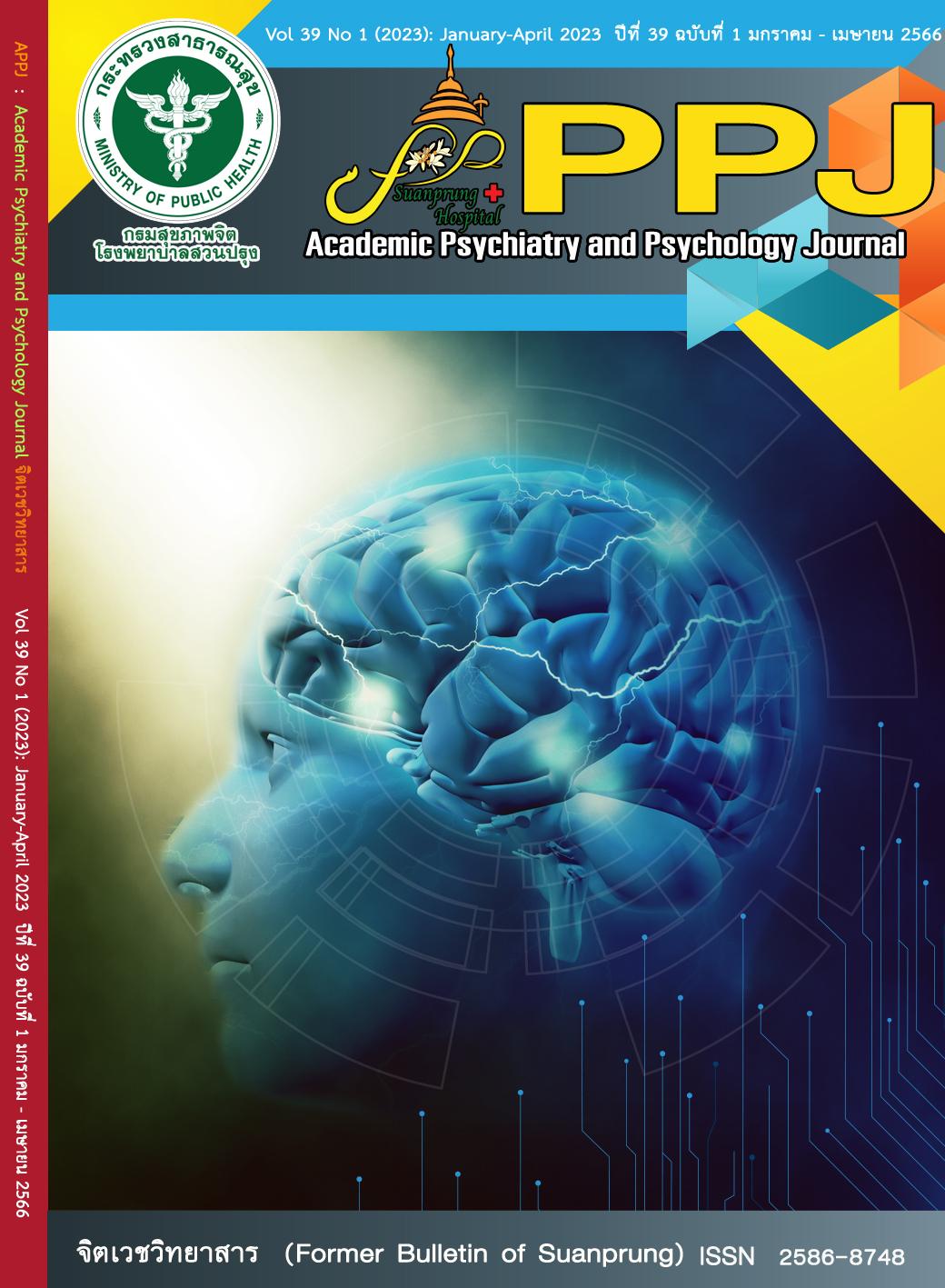Association between parental burden and glycemic control in children with diabetes mellitus type 1
Main Article Content
บทคัดย่อ
วัตถุประสงค์ เพื่อศึกษาภาระการดูแลของผู้ปกครองผู้ป่วยเด็กที่เป็นโรคเบาหวานชนิดที่ 1 และศึกษาความสัมพันธ์ระหว่างภาระการดูแลของผู้ปกครอง รวมถึงปัจจัยทางจิตสังคมอื่น ๆ กับการควบคุมระดับน้ำตาลในเลือดของผู้ป่วยเด็กที่เป็นโรคเบาหวานชนิดที่ 1 ที่มารับการรักษาที่แผนกกุมารเวชศาสตร์ โรงพยาบาลจุฬาลงกรณ์
วิธีการศึกษา เป็นการศึกษาเชิงพรรณนาแบบตัดขวาง โดยศึกษาในกลุ่มอาสาสมัครผู้ปกครองและผู้ป่วยเด็กโรคเบาหวานชนิดที่ 1 ที่มีอายุระหว่าง 8-18 ปี ที่มารับการรักษาแบบผู้ป่วยนอกที่คลินิกเบาหวาน แผนกกุมารเวชศาสตร์ โรงพยาบาลจุฬาลงกรณ์ ระหว่างช่วงเดือนพฤศจิกายน 2564 ถึงเมษายน 2565 จำนวน 55 คู่ โดยเครื่องมือวิจัยนี้ใช้แบบสอบถามในการเก็บข้อมูลทั่วไปของผู้ป่วยเด็กและผู้ปกครอง ประเมินภาระการดูแลของผู้ปกครอง แบบประเมินภาวะซึมเศร้าและวิตกกังวลในผู้ปกครอง รวมถึงคุณภาพชีวิตของผู้ป่วยเด็กที่เป็นเบาหวาน ประกอบกับใช้ข้อมูลจากเวชระเบียนในการเก็บข้อมูลระดับน้ำตาลในเลือดและโรคประจำตัวของผู้ป่วยเด็ก นำเสนอผลการวิจัยด้วยสถิติเชิงพรรณนา และวิเคราะห์ความสัมพันธ์ระหว่างปัจจัยด้วยสถิติ Independent T-test, Pearson’s Chi-square test, Fisher’s exact test, test, Pearson correlation และ Multiple logistic regression
ผลการศึกษา พบว่า ร้อยละ 25.50 ของผู้ป่วยเด็กสามารถควบคุมระดับน้ำตาลในเลือดได้ตามเกณฑ์ คะแนนเฉลี่ยของภาระการดูแลบุตรของผู้ปกครองอยู่ที่ 36.34 คะแนน มีส่วนเบี่ยงเบนมาตรฐานเท่ากับ 22.86 คะแนน พบความแตกต่างอย่างมีนัยสำคัญทางสถิติของค่าคะแนนภาระการดูแลบุตรของผู้ปกครองเฉลี่ยระหว่างกลุ่มผู้ป่วยเด็กที่ควบคุมระดับน้ำตาลในเลือดได้ดีกับกลุ่มผู้ป่วยเด็กที่ควบคุมระดับน้ำตาลในเลือดได้ไม่ดี (t = 2.40, P = 0.020, Cohen’s d = 0.74) แต่ไม่พบความสัมพันธ์ที่มีนัยสำคัญทางสถิติระหว่างตัวแปรทางจิตสังคมที่ศึกษากับการควบคุมระดับน้ำตาลในเลือดของผู้ป่วยเบาหวานเด็ก พบความสัมพันธ์ระหว่างคะแนนคุณภาพชีวิตผู้ป่วยเด็กด้านจิตสังคมที่ประเมินโดยผู้ปกครองกับภาระการดูแลของผู้ปกครองเท่ากับ -0.325 โดยมีนัยสำคัญทางสถิติ (p-value=0.015)
สรุป ผลการศึกษาแสดงความสัมพันธ์อย่างมีนัยสำคัญระหว่างภาระการดูแลของผู้ปกครองกับการควบคุมน้ำตาลในเลือดของผู้ป่วยเด็ก ทั้งนี้ การให้การดูแลเรื่องสุขภาวะทางด้านจิตใจอารมณ์ของผู้ปกครอง ตั้งแต่การให้ความสำคัญ ถามคำถามคัดกรอง ให้คำแนะนำปรึกษา และส่งต่อเพื่อการดูแลรักษาที่เหมาะสม จะช่วยให้ผลลัพธ์ของการรักษาโรคเบาหวานชนิดที่ 1 ในผู้ป่วยเด็กดีขึ้น
Article Details

อนุญาตภายใต้เงื่อนไข Creative Commons Attribution-NonCommercial-NoDerivatives 4.0 International License.
บทความหลังผ่านการปรับแก้จากกองบรรณาธิการแล้ว เป็นลิขสิทธ์ของวารสารจิตเวชวิทยาสาร โรงพยาบาลสวนปรุง กรมสุขภาพจิต กระทรวงสาธารณสุข ห้ามเผยแพร่เพื่อประโยชน์ทางการค้าโดยไม่ได้รับอนุญาต แต่อนุญาตให้เผยแพร่บทความดังกล่าวเพื่อประโยชน์ทางการศึกษาแก่ประชาชนทั่วไป ทั้งนี้กองบรรณาธิการไม่จำเป็นต้องเห็นด้วยกับบทความหรือข้อคิดเห็นใดๆ ที่ปรากฏในวารสารสวนปรุง
เอกสารอ้างอิง
Diabetes Association of Thailand. Clinical Practice Guideline for Diabetes 2017. Pathum Thani: Romyen Media Company Limited; 2017. [in Thai]
Mobasseri M, Shirmohammadi M, Amiri T, Vahed N, Hosseini Fard H, Ghojazadeh M. Prevalence and incidence of type 1 diabetes in the world: a systematic review and meta-analysis. Health Promot Perspect 2020;10(2):98-115.
Rittiphairoj T, Owais M, Ward ZJ, Reddy CL, Yeh JM, Atun R. Incidence and prevalence of type 1 diabetes and diabetic ketoacidosis in children and adolescents (0-19 years) in Thailand (2015-2020): A nationwide population-based study. Lancet Reg Health West Pac 2022;21:100392.
Dejkhamron P, Santiprabhob J, Likitmaskul S, Deerochanawong C, Rawdaree P, Tharavanij T, et al. Type 1 diabetes management and outcomes: A multicenter study in Thailand. J Diabetes Investig 2021;12(4):516-26.
Moreland EC, Tovar A, Zuehlke JB, Butler DA, Milaszewski K, Laffel LM. The impact of physiological, therapeutic and psychosocial variables on glycemic control in youth with type 1 diabetes mellitus. J Pediatr Endocrinol Metab 2004;17(11):1533-44.
Butler DA, Zuehlke JB, Tovar A, Volkening LK, Anderson BJ, Laffel LM. The impact of modifiable family factors on glycemic control among youth with type 1 diabetes. Pediatr Diabetes 2008;9(4 Pt 2):373-81.
Anderson BJ, Vangsness L, Connell A, Butler D, Goebel-Fabbri A, Laffel LM. Family conflict, adherence, and glycaemic control in youth with short duration Type 1 diabetes. Diabet Med 2002;19(8):635-42.
Markowitz JT, Volkening LK, Butler DA, Antisdel-Lomaglio J, Anderson BJ, Laffel LMB. Re-examining a measure of diabetes-related burden in parents of young people with Type 1 diabetes: the Problem Areas in Diabetes Survey – Parent Revised version (PAID-PR). Diabetic Medicine 2012;29(4):526-30.
Mazarello PV, Charalampopoulos D, Edge J, Taylor-Robinson D, Stephenson T, Amin R. Predictors of glycemic control in the first year of diagnosis of childhood onset type 1 diabetes: A systematic review of quantitative evidence. Pediatr Diabetes 2018;19(1):18-26.
Mazarello PV, Barrett JK, Dunger DB, Gevers EF, Taylor-Robinson DC, Viner RM, et al. Factors predicting poor glycemic control in the first two years of childhood onset type 1 diabetes in a cohort from East London, UK: Analyses using mixed effects fractional polynomial models. Pediatr Diabetes 2020;21(2):288-99.
Alassaf A, Gharaibeh L, Odeh R, Ibrahim S, Ajlouni K. Predictors of glycemic control in children and adolescents with type 1 diabetes at 12 months after diagnosis. Pediatr Diabetes 2022;23(6):729-35.
Jaser SS, Linsky R, Grey M. Coping and Psychological Distress in Mothers of Adolescents with Type 1 Diabetes. Maternal and Child Health Journal 2014;18(1):101-8.
Tsiouli E, Alexopoulos EC, Stefanaki C, Darviri C, Chrousos GP. Effects of diabetes-related family stress on glycemic control in young patients with type 1 diabetes. Systematic review 2013;59(2):143-9.
Rumburg TM, Lord JH, Savin KL, Jaser SS. Maternal diabetes distress is linked to maternal depressive symptoms and adolescents' glycemic control. Pediatric Diabetes 2017;18(1):67-70.
Viaene AS, Van Daele T, Bleys D, Faust K, Massa GG. Fear of Hypoglycemia, Parenting Stress, and Metabolic Control for Children with Type 1 Diabetes and Their Parents. J Clin Psychol Med Settings 2017;24(1):74-81.
Chiang JL, Maahs DM, Garvey KC, Hood KK, Laffel LM, Weinzimer SA, et al. Type 1 Diabetes in Children and Adolescents: A Position Statement by the American Diabetes Association. Diabetes Care 2018;41(9):2026-44.
American Diabetes Association. Children and Adolescents: Standards of Medical Care in Diabetes—2019. Diabetes Care 2018;42(Supplement_1):S148-S64.
Tinsley LJ, Commissariat PV, Volkening L, Anderson B, KATZ M, Laffel LM. Establishing a Clinically Meaningful Cut-Point for the PAID-PR (Problem Areas in Diabetes-Parent Revised) Survey. Diabetes 2018;67(Supplement_1).
Sritipsukho P, Wisai M, Thavorncharoensap M. Reliability and validity of the Thai version of the Pediatric Quality of Life Inventory 4.0. Qual Life Res 2013;22(3):551-7.
Varni JW, Burwinkle TM, Seid M. The PedsQL as a pediatric patient-reported outcome: reliability and validity of the PedsQL Measurement Model in 25000 children. Expert Rev Pharmacoecon Outcomes Res 2005;5(6):705-19.
Kim J, Chung H, Amtmann D, Salem R, Park R, Askew RL. Symptoms and quality of life indicators among children with chronic medical conditions. Disabil Health J 2014;7(1):96-104.
Nilchaikovit T, Lotrakul M, Phisansuthideth U. Development of Thai version of hospital anxiety and depression scale in cancer patients. J Psychiatr Assoc Thai 1996;41:18-30.
Gough K, Hudson P. Psychometric properties of the Hospital Anxiety and Depression Scale in family caregivers of palliative care patients. J Pain Symptom Manage 2009;37(5):797-806.
Lohiya NN, Kajale NA, Lohiya NN, Khadilkar VV, Gondhalekar K, Khadilkar A. Diabetes distress in Indian children with type 1 diabetes mellitus and their mothers. J Pediatr Endocrinol Metab 2021;34(2):209-16.
Eilander MMA, Snoek FJ, Rotteveel J, Aanstoot HJ, Bakker-van Waarde WM, Houdijk E, et al. Parental Diabetes Behaviors and Distress Are Related to Glycemic Control in Youth with Type 1 Diabetes: Longitudinal Data from the DINO Study. J Diabetes Res 2017;2017:1462064.
Nguyen LA, Pouwer F, Lodder P, Hartman E, Winterdijk P, Aanstoot HJ, et al. Depression and anxiety in adolescents with type 1 diabetes and their parents. Pediatr Res 2022;91(1):188-96.
Whittemore R, Jaser S, Chao A, Jang M, Grey M. Psychological experience of parents of children with type 1 diabetes: a systematic mixed-studies review. Diabetes Educ 2012;38(4):562-79.
Dumrisilp T, Supornsilchai V, Wacharasindhu S, Aroonparkmongkol S, Sahakitrungruang T. Factors associated with glycemic control in children and adolescents with type 1 diabetes mellitus at a tertiary-care center in Thailand: a retrospective observational study. Asian Biomedicine 2017;11(6):443-50.

